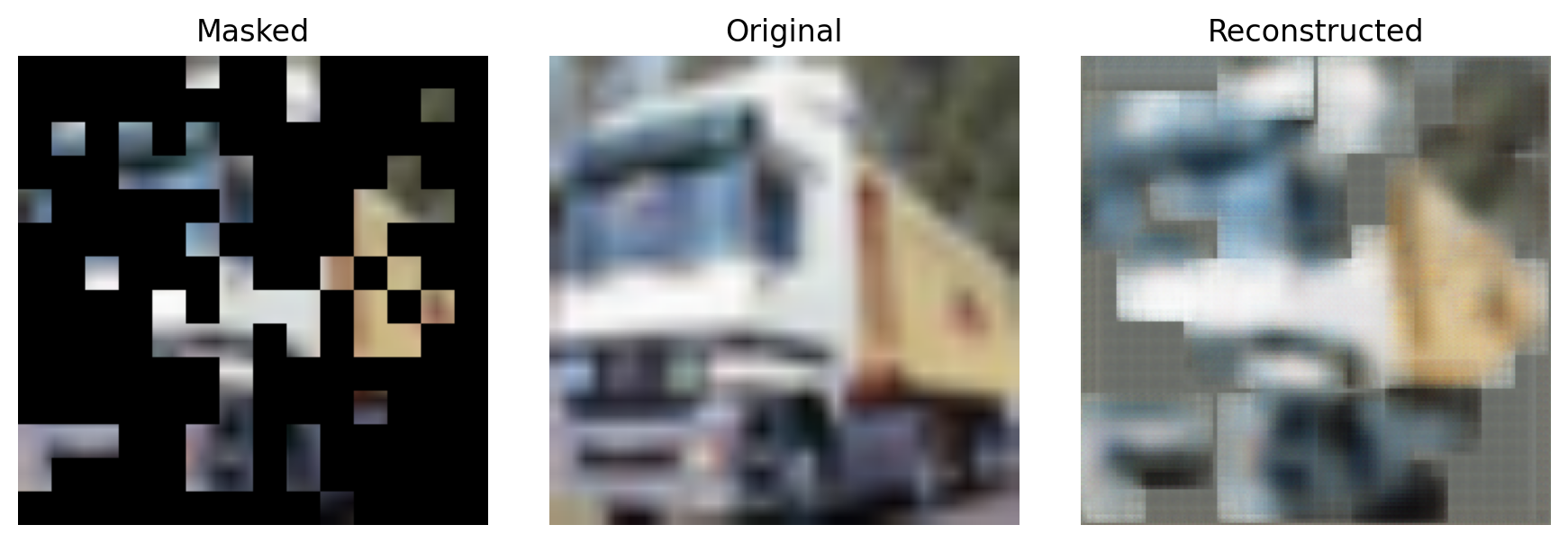from torchvision import transforms
from torch.utils.data import Dataset
from PIL import Image
import numpy as np
import torch
%config InlineBackend.figure_format = 'retina'
class MaskedImageDataset(Dataset):
def __init__(self, base_dataset, mask_ratio=0.75):
self.base = base_dataset
self.mask_ratio = mask_ratio
def __len__(self):
return len(self.base)
def __getitem__(self, idx):
img, _ = self.base[idx] # ignore label
mask = torch.rand_like(img[:1]) > self.mask_ratio # [1,H,W]
masked_img = img * mask # zero out masked pixels
return masked_img, img # (X=masked, Y=original)from torchvision import datasets
transform = transforms.Compose([
transforms.Resize((224,224)),
transforms.ToTensor()
])
from torch.utils.data import Subset
# full CIFAR10
train_base = datasets.CIFAR10(root='./data', train=True, download=True, transform=transform)
test_base = datasets.CIFAR10(root='./data', train=False, download=True, transform=transform)
# take first 1000 samples from each
train_small = Subset(train_base, range(1000))
test_small = Subset(test_base, range(1000))
# wrap with masking dataset
train_masked = MaskedImageDataset(train_small, mask_ratio=0.75)
test_masked = MaskedImageDataset(test_small, mask_ratio=0.75)
# dataloaders
from torch.utils.data import DataLoader
train_loader = DataLoader(train_masked, batch_size=16, shuffle=False)
test_loader = DataLoader(test_masked, batch_size=16, shuffle=False)
print(len(train_loader.dataset), len(test_loader.dataset))1000 1000x, y = train_masked[0]
print(x.shape, y.shape) # both [3,224,224]
import matplotlib.pyplot as plt
plt.subplot(1,2,1)
plt.imshow(x.permute(1,2,0)) # masked
plt.subplot(1,2,2)
plt.imshow(y.permute(1,2,0)) # original
plt.show()torch.Size([3, 224, 224]) torch.Size([3, 224, 224])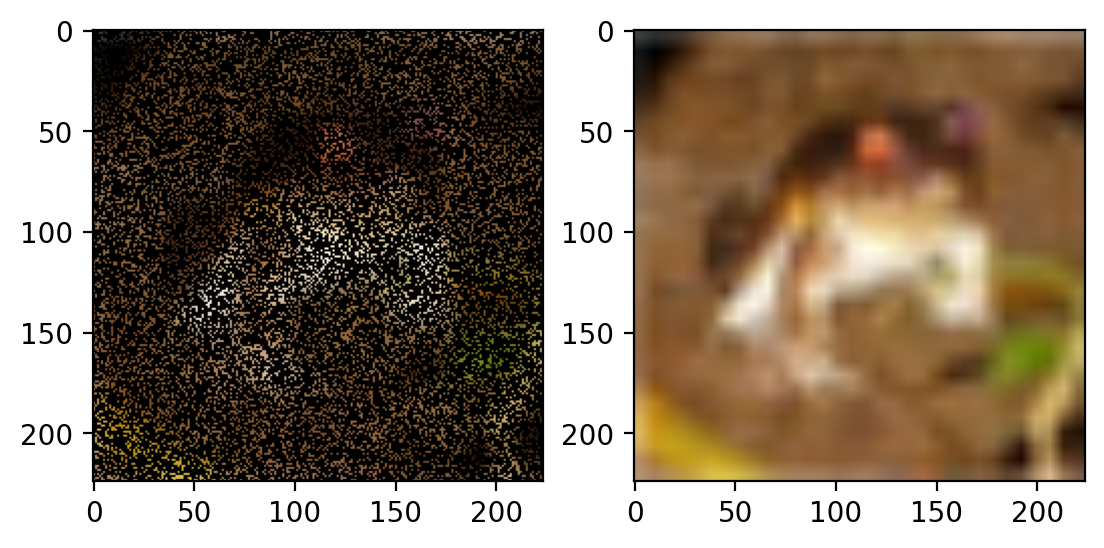
import torch.nn as nn
class SimpleAutoencoder(nn.Module):
def __init__(self):
super().__init__()
self.encoder = nn.Sequential(
nn.Conv2d(3, 32, 4, 2, 1), # 112×112
nn.ReLU(),
nn.Conv2d(32, 64, 4, 2, 1), # 56×56
nn.ReLU(),
nn.Conv2d(64, 128, 4, 2, 1),# 28×28
nn.ReLU()
)
self.decoder = nn.Sequential(
nn.ConvTranspose2d(128, 64, 4, 2, 1), # 56×56
nn.ReLU(),
nn.ConvTranspose2d(64, 32, 4, 2, 1), # 112×112
nn.ReLU(),
nn.ConvTranspose2d(32, 3, 4, 2, 1), # 224×224
nn.Sigmoid()
)
def forward(self, x):
z = self.encoder(x)
out = self.decoder(z)
return outmodel = SimpleAutoencoder()
device = torch.device("mps" if torch.backends.mps.is_available() else "cpu")
model = model.to(device)def visualize_reconstruction(model, dataset, idx=0, device='cpu'):
"""Visualize one reconstruction from a masked dataset."""
model.eval()
x_masked, y_full = dataset[idx]
x_masked = x_masked.unsqueeze(0).to(device)
y_full = y_full.unsqueeze(0).to(device)
with torch.no_grad():
recon = model(x_masked)
# Plot side-by-side
plt.figure(figsize=(9, 3))
imgs = [x_masked[0], y_full[0], recon[0]]
titles = ["Masked", "Original", "Reconstructed"]
for i in range(3):
plt.subplot(1, 3, i + 1)
plt.imshow(imgs[i].permute(1, 2, 0).cpu().clamp(0, 1))
plt.title(titles[i])
plt.axis("off")
plt.tight_layout()
plt.show()
visualize_reconstruction(model, train_masked, idx=1, device=device)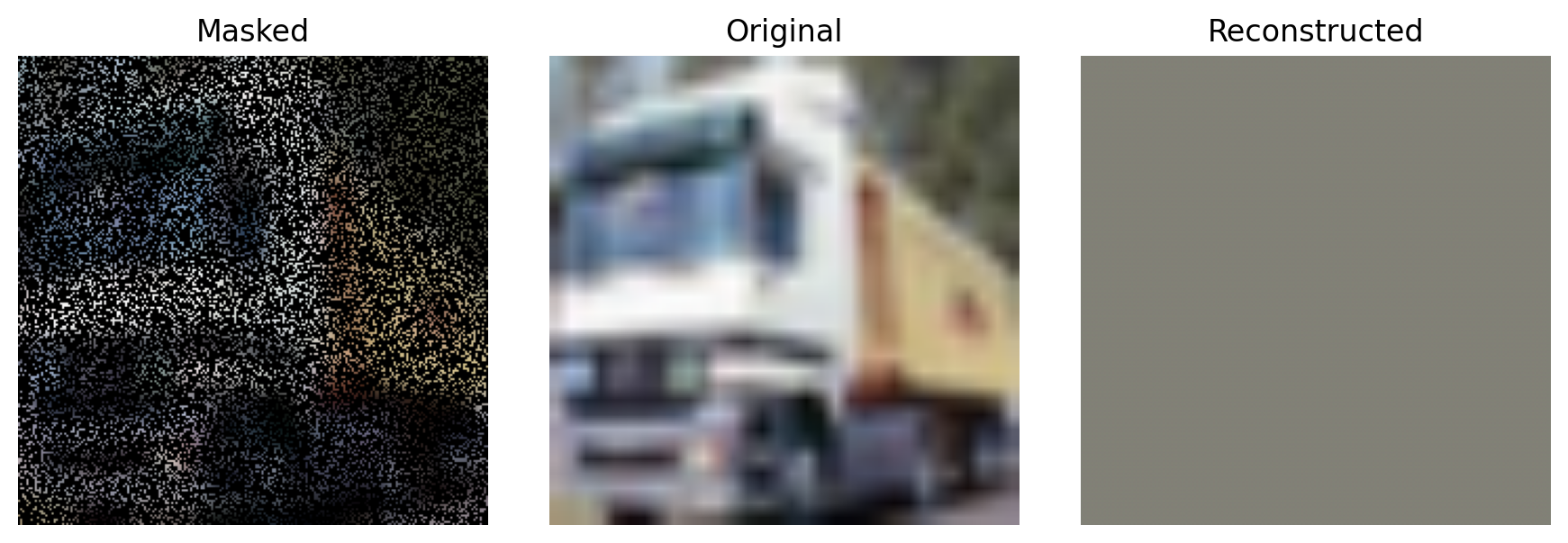
model = SimpleAutoencoder().to(device)
optimizer = torch.optim.Adam(model.parameters(), lr=3e-4)
criterion = nn.MSELoss()
def train_autoencoder(model, train_loader, optimizer, criterion, device, epochs=5):
model.to(device)
model.train()
for epoch in range(epochs):
total_loss = 0.0
for x_masked, y_full in train_loader:
x_masked, y_full = x_masked.to(device), y_full.to(device)
# Forward → Backward → Optimize
pred = model(x_masked)
loss = criterion(pred, y_full)
optimizer.zero_grad()
loss.backward()
optimizer.step()
total_loss += loss.item() * x_masked.size(0)
epoch_loss = total_loss / len(train_loader.dataset)
print(f"Epoch {epoch+1}/{epochs} | Train Loss: {epoch_loss:.4f}")
train_autoencoder(model, train_loader, optimizer, criterion, device, epochs=10)
Epoch 1/10 | Train Loss: 0.0397
Epoch 2/10 | Train Loss: 0.0257
Epoch 3/10 | Train Loss: 0.0226
Epoch 4/10 | Train Loss: 0.0211
Epoch 5/10 | Train Loss: 0.0200
Epoch 6/10 | Train Loss: 0.0193
Epoch 7/10 | Train Loss: 0.0191
Epoch 8/10 | Train Loss: 0.0191
Epoch 9/10 | Train Loss: 0.0189
Epoch 10/10 | Train Loss: 0.0182visualize_reconstruction(model, train_masked, idx=1, device=device)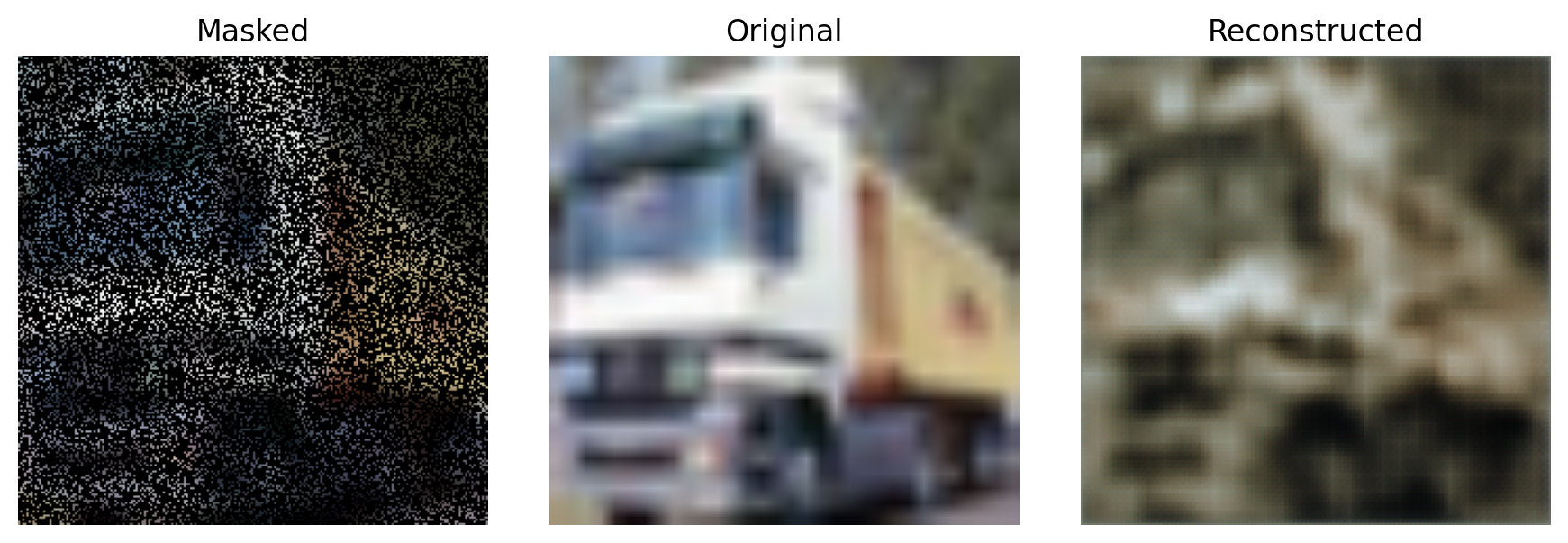
Now, let us improve the model by adding skip connections like in U-Net.
import torch.nn.functional as F
class SkipAutoencoder(nn.Module):
def __init__(self):
super().__init__()
self.enc1 = nn.Conv2d(3, 32, 4, 2, 1)
self.enc2 = nn.Conv2d(32, 64, 4, 2, 1)
self.enc3 = nn.Conv2d(64, 128, 4, 2, 1)
self.dec3 = nn.ConvTranspose2d(128, 64, 4, 2, 1)
self.dec2 = nn.ConvTranspose2d(64+64, 32, 4, 2, 1)
self.dec1 = nn.ConvTranspose2d(32+32, 3, 4, 2, 1)
def forward(self, x):
x1 = F.relu(self.enc1(x)) # 112x112
x2 = F.relu(self.enc2(x1)) # 56x56
x3 = F.relu(self.enc3(x2)) # 28x28
y3 = F.relu(self.dec3(x3)) # 56x56
y2 = F.relu(self.dec2(torch.cat([y3, x2], 1))) # skip
y1 = torch.sigmoid(self.dec1(torch.cat([y2, x1], 1)))
return y1model = SkipAutoencoder().to(device)
optimizer = torch.optim.Adam(model.parameters(), lr=3e-4)
criterion = nn.MSELoss()
train_autoencoder(model, train_loader, optimizer, criterion, device, epochs=10)Epoch 1/10 | Train Loss: 0.0449
Epoch 2/10 | Train Loss: 0.0283
Epoch 3/10 | Train Loss: 0.0236
Epoch 4/10 | Train Loss: 0.0218
Epoch 5/10 | Train Loss: 0.0195
Epoch 6/10 | Train Loss: 0.0187
Epoch 7/10 | Train Loss: 0.0174
Epoch 8/10 | Train Loss: 0.0173
Epoch 9/10 | Train Loss: 0.0164
Epoch 10/10 | Train Loss: 0.0159visualize_reconstruction(model, train_masked, idx=1, device=device)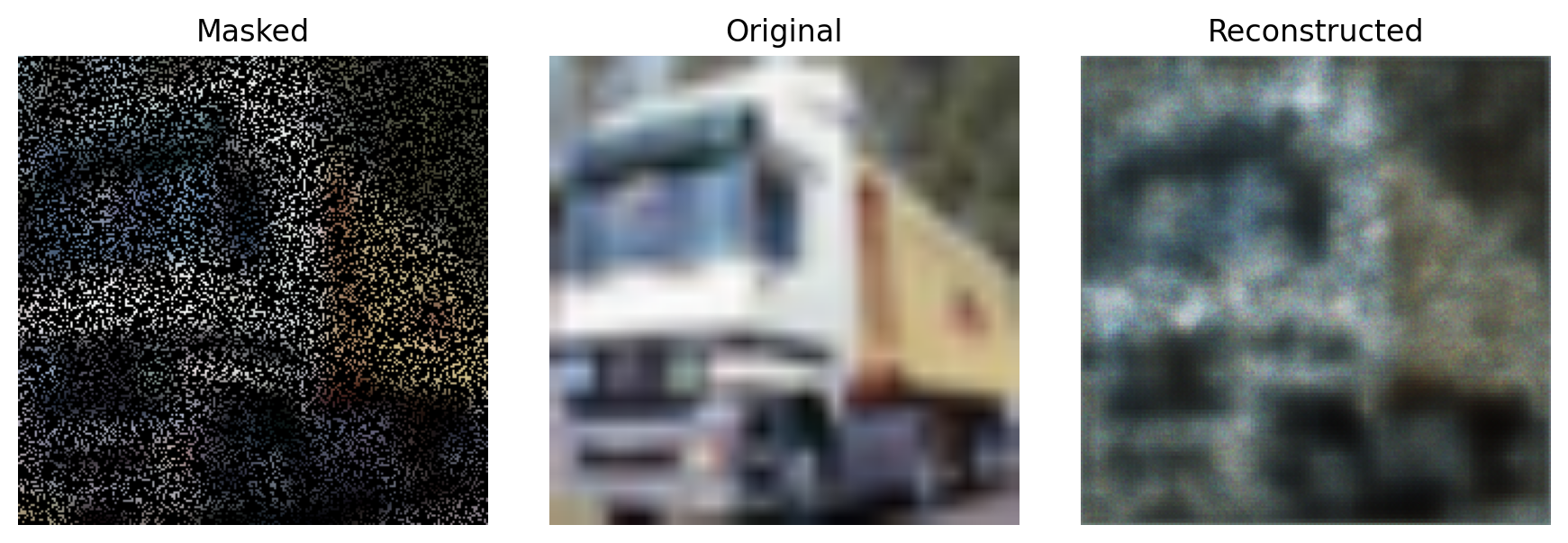
We can see that the skip connections help a lot in reconstructing the original image from the masked input. The colors match much better and the details are clearer.
Mask out entire patches
class PatchMaskedDataset(Dataset):
def __init__(self, base_dataset, patch_size=16, mask_ratio=0.75):
self.base_dataset = base_dataset
self.patch_size = patch_size
self.mask_ratio = mask_ratio
def __len__(self):
return len(self.base_dataset)
def __getitem__(self, idx):
img, _ = self.base_dataset[idx] # we don’t use labels for MAE
C, H, W = img.shape
assert H % self.patch_size == 0 and W % self.patch_size == 0
# --- Split into patches ---
h_patches = H // self.patch_size
w_patches = W // self.patch_size
total_patches = h_patches * w_patches
# --- Choose patches to mask ---
num_mask = int(total_patches * self.mask_ratio)
mask_indices = np.random.choice(total_patches, num_mask, replace=False)
# --- Make copy for masked version ---
img_masked = img.clone()
for idx_mask in mask_indices:
r = idx_mask // w_patches
c = idx_mask % w_patches
y0, y1 = r * self.patch_size, (r + 1) * self.patch_size
x0, x1 = c * self.patch_size, (c + 1) * self.patch_size
img_masked[:, y0:y1, x0:x1] = 0.0 # zero out full patch
return img_masked, imgtransform = transforms.Compose([
transforms.Resize((224, 224)),
transforms.ToTensor()
])
train_base = datasets.CIFAR10(root='./data', train=True, download=True, transform=transform)
test_base = datasets.CIFAR10(root='./data', train=False, download=True, transform=transform)
# Take small subset for educational speed
from torch.utils.data import Subset
train_small = Subset(train_base, range(1000))
test_small = Subset(test_base, range(1000))
# Wrap with patch-mask dataset
train_pmask = PatchMaskedDataset(train_small, patch_size=16, mask_ratio=0.75)
test_pmask = PatchMaskedDataset(test_small, patch_size=16, mask_ratio=0.75)
from torch.utils.data import DataLoader
train_loader = DataLoader(train_pmask, batch_size=8, shuffle=True)
test_loader = DataLoader(test_pmask, batch_size=8, shuffle=False)model = SkipAutoencoder().to(device)
optimizer = torch.optim.Adam(model.parameters(), lr=3e-4)
criterion = nn.MSELoss()
visualize_reconstruction(model, train_pmask, idx=1, device=device)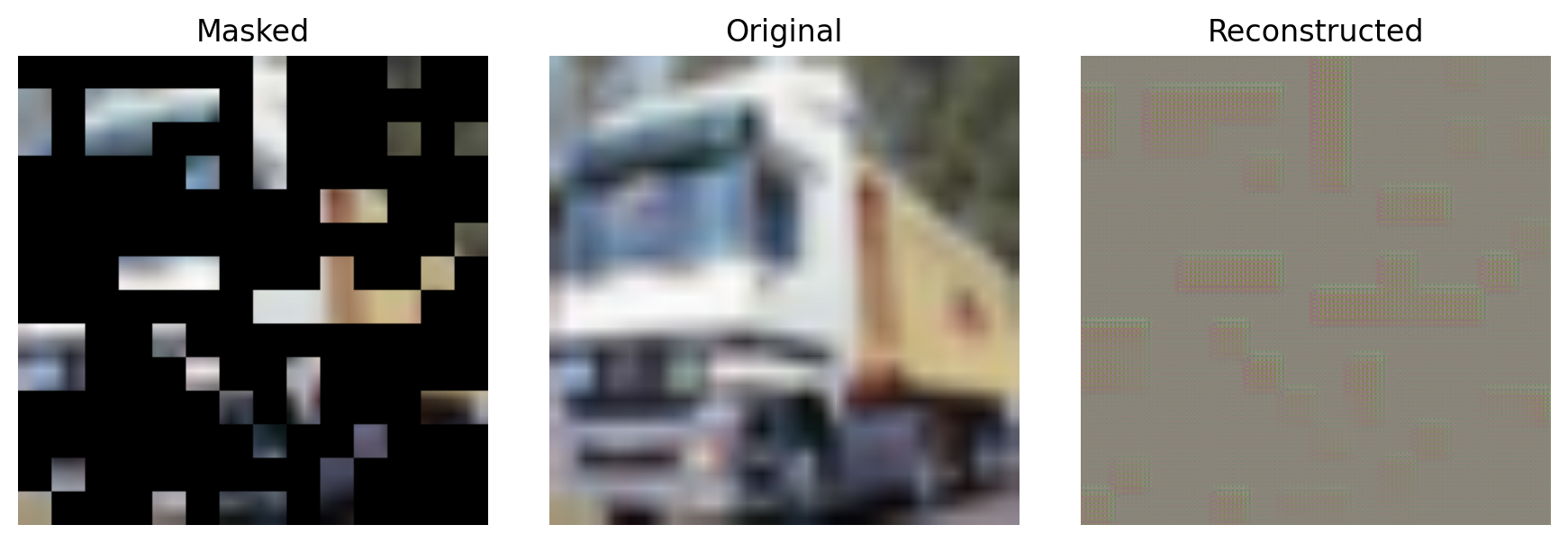
train_autoencoder(model, train_loader, optimizer, criterion, device, epochs=15)Epoch 1/15 | Train Loss: 0.0412
Epoch 2/15 | Train Loss: 0.0267
Epoch 3/15 | Train Loss: 0.0239
Epoch 4/15 | Train Loss: 0.0220
Epoch 5/15 | Train Loss: 0.0208
Epoch 6/15 | Train Loss: 0.0198
Epoch 7/15 | Train Loss: 0.0192
Epoch 8/15 | Train Loss: 0.0180
Epoch 9/15 | Train Loss: 0.0180
Epoch 10/15 | Train Loss: 0.0174
Epoch 11/15 | Train Loss: 0.0168
Epoch 12/15 | Train Loss: 0.0159
Epoch 13/15 | Train Loss: 0.0156
Epoch 14/15 | Train Loss: 0.0150
Epoch 15/15 | Train Loss: 0.0150visualize_reconstruction(model, train_pmask, idx=1, device=device)